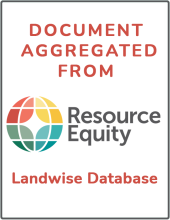Land Library Search
Through our robust search engine, you can search for any item of the over 73,000 highly curated resources in the Land Library.
If you would like to find an overview of what is possible, feel free to peruse the Search Guide.
/ library resources
Showing items 1 through 9 of 72."A dramatic increase over the past fifteen years in domestic pork demand and production in the Philippines has created a potentially profitable opportunity for poor rural and agricultural households.
"Kenya’s economy is relatively diverse, with both agricultural and industrial potential. However, the economy has performed poorly over the last decade, and poverty and inequality have risen.
TA mixed-methods, multiple-stage approach was used to obtain data on how gender and wealth affected participation in community groups in Meru, Kenya, and how men and women farmers obtain and diffuse agricultural information.
In the past 20 years Ghana has significantly advanced economic development and reduced poverty. Between 1984 and 2004, the country’s real gross domestic product (GDP) grew by 4.8 percent a year.
Rising poverty in rural Uganda is linked to increasing landlessness, as the latter drives land degradation and reduces agricultural productivity. This paper examines the complex relationship between owning land and poverty.
Possession of vast lands is a major representation of wealth in the Philippines - a privilege enjoyed largely by the ruling class since the colonial era. This ownership of huge tracts of land has resulted in numerous political, social, and economic inequalities.
Land is the repository of memory and keeps traces of the past in the absence of a strong written tradition. It is perceived as an open book from which anyone can read and learn about local history: place names, old roads, legends and stories attached to places.
This paper analyzes the problem of irrigation provision through a public infrastructure in an environment of Asymmetric Information (AI) in a dry area of Ecuador.





